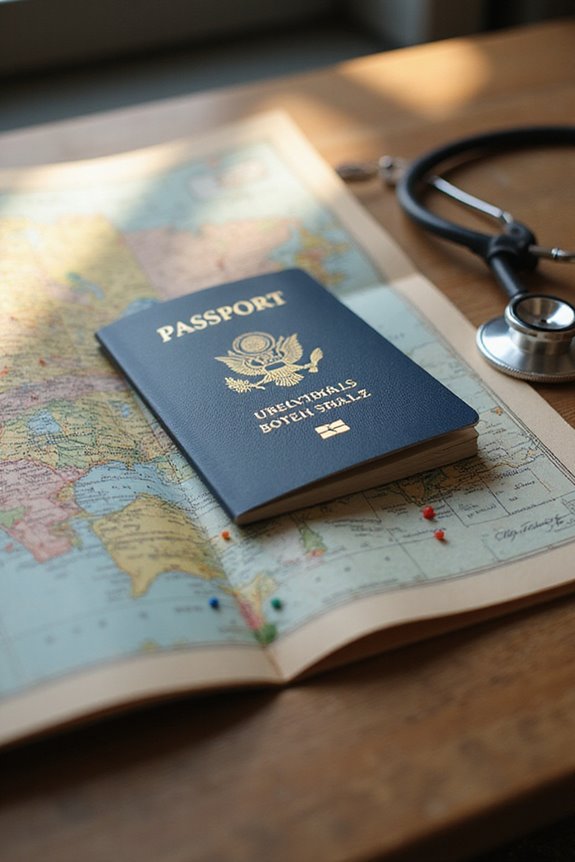Before I jet off on any international adventures, I always check which vaccinations I’ll need—trust me, it’s a lifesaver! Routine shots like MMR and polio are a must, but then there are places where I need a yellow fever vaccine and a “yellow card” to prove it. Sometimes there are other country-specific requirements, especially with COVID-19 floating around. It’s all about staying healthy and enjoying the trip, so let’s explore what else I’ve learned!
Key Takeaways
- Review and update routine vaccinations like MMR and polio at least 4 to 6 weeks before traveling.
- Check for country-specific vaccination requirements, including yellow fever and measles, before your trip.
- Consider vaccinations for diseases common in your destination, such as Hepatitis A and typhoid, especially in areas with poor sanitation.
- Stay informed about COVID-19 regulations, as some countries may require proof of vaccination or recent negative tests.
- Always carry vaccination documentation, including the “yellow card” for yellow fever, to avoid entry issues.
Routine Vaccines for All Travelers

When it comes to international travel, I can’t stress enough how essential it is to stay on top of your routine vaccinations. Seriously, no one wants to be caught off-guard by preventable diseases while roaming the globe! Routine vaccinations like MMR and polio not only protect you but also help keep traveler health in check, reducing the risk of spreading illnesses, which is a win-win. Trust me, before packing your suitcase, review your immunization records at least 4 to 6 weeks ahead of time. Some countries even require proof of specific vaccines for entry. So, roll up your sleeve, get those shots updated, and let travel become an exciting adventure rather than a health risk. Your future self will thank you!
Yellow Fever Vaccination Requirements
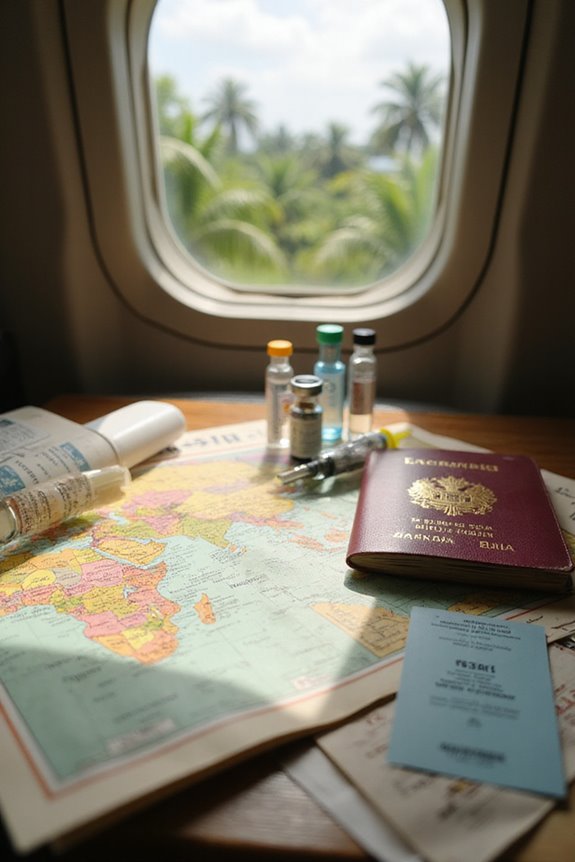
Although many travelers might overlook it, understanding yellow fever vaccination requirements is essential for anyone planning a trip to areas where the disease lurks. I’ve learned the hard way that yellow fever is no joke; it’s a viral infection spread by mosquitoes, especially in Africa and South America. Getting vaccinated is one of the best things you can do for your health—the vaccination benefits are huge! Not only does it protect you from getting sick, but it also helps stop the virus from spreading. Plus, you’ll receive a “yellow card,” proving you’ve been vaccinated, which some countries require for entry. Trust me, a little prep could save you from a potential travel nightmare!
Country-Specific Vaccine Entry Requirements
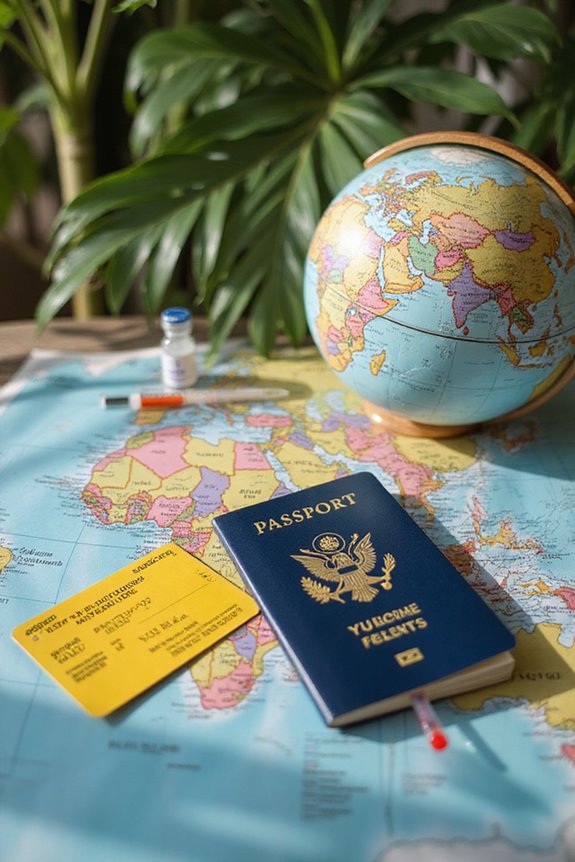
Have you ever found yourself scrambling for the right vaccination documents just before you board a flight? Trust me, it’s exhilarating! Different countries have their own country-specific guidelines, and neglecting to follow them can lead to a less-than-ideal vacation. For instance, many places require proof of measles vaccination or even Hepatitis A shots before you can step foot on their soil. Plus, regions with high COVID-19 rates might still have testing or vaccination requirements in place to keep outbreaks at bay. So, always check regional health regulations before you pack your bags. I once missed an amazing beach trip because of overlooked vaccine questions, and believe me, I learned my lesson! Stay informed, stay safe, and enjoy your travels!
Vaccinations for Common Travel-Associated Diseases
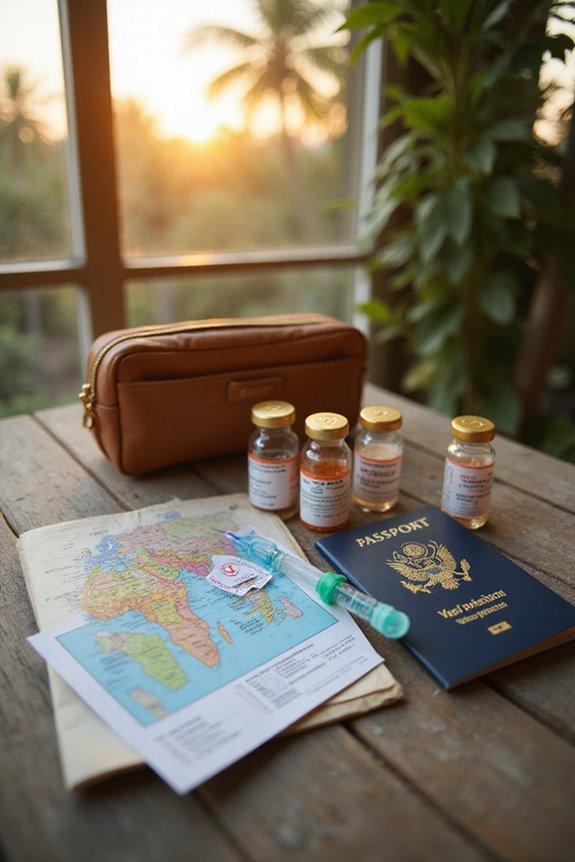
Traveling to new places is exhilarating, but nothing can spoil that excitement quite like getting hit with a nasty illness when you’re miles away from home. I’ve learned the hard way that vaccinations are essential. Hepatitis vaccinations are vital if you’re venturing into places with poor sanitation. Don’t skip on Typhoid prevention either; it’s a sneaky one from contaminated food! Depending on your destination, get that Yellow fever jab, especially in Africa and South America. Meningitis outbreaks can happen too, particularly in certain regions. As flu season rolls in, remember those Influenza risks! Oh, and if rabies exposure is a possibility, don’t mess around—get vaccinated! Finally, be aware of mosquitoes for Dengue fever and keep an eye on Malaria prevention. Stay safe!
Special Considerations for COVID-19 Vaccination
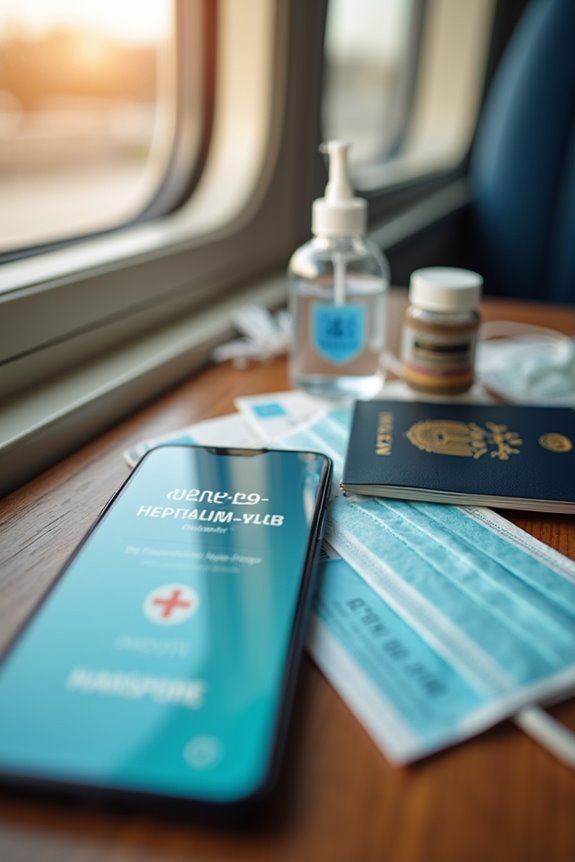
When it comes to the twists and turns of international travel, keeping up with COVID-19 vaccinations is essential—especially if you don’t want to find yourself in a quarantine limbo. I’ve learned that knowing the latest COVID-19 vaccination updates can save you a lot of hassle. Some countries, like Italy and many EEA nations, have dropped proof of vaccination for entry, which is awesome! But don’t get too comfy; regulations can change faster than my flight was delayed last summer. It’s wise to check travel health guidelines before you go. If you’re older or have health conditions, don’t skip that booster; it’s a little peace of mind. Plus, being vaccinated can make your travels smoother and more enjoyable!
Planning and Timing for Travel Vaccinations
How do you make certain you’re ready for your international adventure? Planning ahead is key! I always schedule a pre-travel consultation with my healthcare provider about 4–8 weeks before I fly out. This timeline allows time for any required vaccines to kick in and means I won’t rush at the last minute, risking incomplete protection. Some vaccinations require multiple doses, so getting started early really pays off. For those traveling with little ones, vaccines like measles can often be given earlier than usual. I’ve learned to check travel notices for my destination, too; it’s a game changer. By tackling the vaccination timeline together, I make sure I’m fully protected before an exciting journey begins!
Vaccination Records and Documentation
Getting everything ready for an international trip can feel like a whirlwind, and just when I think I’ve covered all my bases, there’s the matter of vaccination records and documentation. It’s like a treasure hunt—finding that International Certificate of Vaccination or Prophylaxis, also known as the “Yellow Card.” This little piece of paper proves I’m vaccinated against diseases required by my destination. Plus, some places want a passenger locator form, too. I always keep a digital copy handy, just in case! It’s essential to stay updated with vaccines, especially those like yellow fever, which take time to kick in. Trust me, nothing’s worse than being turned away at border control because I forgot my vaccination documentation!
Understanding Destination-Specific Risks
While packing my bags for another adventure, I can’t help but think about the unique challenges each destination brings, especially when it comes to health risks. A solid destination risk assessment is essential. For instance, I always check if yellow fever vaccinations are mandatory, particularly in certain African and South American countries. Plus, I’ve learned to stay on top of polio requirements in high-risk zones like Afghanistan. And let’s not forget endemic disease awareness – knowing what diseases are prevalent at my destination shapes my vaccination choices. Some vaccines, like measles or typhoid, aren’t officially required but are smart precautions for my well-being. Traveling can be unpredictable, but being prepared gives me peace of mind as I explore new places.
Consulting Health Authorities Before Travel
Before starting on any international adventure, I always make it a point to consult with health authorities. This pre-travel consultation is vital, as it gives me a tailored health risk assessment. It’s not just about vaccinations, but understanding the specific risks tied to my destination. Do I need malaria meds? Should I be careful with street food? Every trip is unique—especially for those of us with underlying health issues or complex itineraries. Health experts know the ins and outs of disease risks, providing essential advice and immunizations to keep me safe. Plus, taking these precautions really helps limit the spread of infections. Trust me; it’s better to be informed than be surprised on a remote mountain trail or during a bustling city tour!
Frequently Asked Questions
Are Vaccinations Covered by Travel Insurance Policies?
Travel insurance policies don’t cover vaccination expenses, so I always check my health insurance for vaccine coverage. It’s essential to guarantee my immunizations are handled elsewhere, considering travel insurance mainly covers emergencies, not prevention.
How Do I Choose a Travel Health Clinic?
When I choose a travel clinic, I look for experienced staff who can provide personalized vaccine recommendations. It’s essential they understand my specific travel plans and health needs to guarantee I’m well-prepared for my trip.
Can I Get Vaccinated at the Airport?
I remember rushing to the airport, hoping for quick vaccinations, but airport vaccination services just don’t exist. I found better options at travel clinics for necessary vaccinations—all part of planning for a safe trip.
What if I’m Allergic to Vaccine Components?
If I’m allergic to vaccine components, I’d definitely consult a healthcare professional about allergy management. They might suggest vaccine alternatives or special procedures to guarantee my safety during the vaccination process.
Are There Age Restrictions for Certain Travel Vaccines?
Yes, there are age limits for certain vaccines. I’ve learned that vaccine recommendations often vary by age, impacting availability and safety. Always check with a healthcare provider to guarantee appropriate immunizations based on age.

